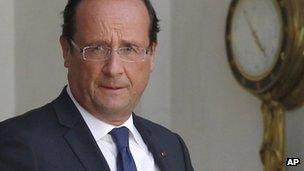Will the rich flee France's 75% tax rate?
- Published

Francois Tripet's office is littered with expensive art work and has one of the most fashionable addresses in Paris, but he is spending less and less time there.
As a tax lawyer to some of the country's richest citizens, he now travels abroad at least once a week to visit his wealthy clients.
"They have already taken the decision to quit France," he says, "to reside either in London, because of its attractive tax regime, or in Brussels and to a lesser extent Geneva."
Mr Tripet's clients are responding to French President Francois Hollande's plan to impose a 75% tax rate on incomes over 1m euros (£800,000; $1.3m).
Fiscal reform
The new tax is expected to be formally announced in the government's first budget on 28 September, but that does not mean there is a sense of panic in France.
This new tax will only hit very rich individuals and only for a year or two, to help bring down the government deficit.
It is not planned to be permanent, nor is it such major concern for French businesses such as Sodexo, a France-based international company that employs more than 400,000 people around the world.
Sodexo runs schools, universities, hospitals and offices for its clients. It does far more business outside France than inside the country.
Yet its chief executive, Michel Landel, has no intention of leaving France, and the tax regime for millionaires is not even top of his agenda.
"France has a very good level of education, the infrastructure is very good, the cost of energy is very good," he says.
"Productivity is quite high in private organisations, and hopefully the government will understand that if they want these companies to remain in France, developing business and creating jobs, they have to make some fundamental reforms in terms of fiscal framework, labour laws and the cost of labour, because that is clearly a challenge."
'Wrong message'
Bringing down the cost of employing staff is a constant refrain that you hear all the time in France.
But that is not to say that a very high tax rate on the highest paid is not deemed problematic by French business.
Pierre-Antoine Gailly, president of the Paris Chamber of Commerce and Industry, says it sends the wrong message to just the kind of people that France needs.
"It is not a good decision because it pinpoints a few people, a couple of thousand who are very talented entrepreneurs and which the country needs to sustain economic development," he says.
"The good thing is that it's only for a couple of years until the deficit falls below 3%."
'Equality is reality'
And this tax rise was hardly unexpected, just as in the UK - where everyone knew that taxes would have to rise and spending would be cut to try to reduce the deficit after the election in May 2010, regardless of who the victor was.
The difference is that in France, the rich are expected to carry a heavier burden, says Romain Gubert, deputy economic editor for Le Point magazine.
"There is greater acceptability of taxes in France than in other countries," he says, "because it is in the [French] DNA that the word equality is a reality.
"It is not Francois Hollande who decided to make the rich pay with a special tax. It is the revolution."
Leaving forever?
For tax lawyer Mr Tripet, the revolution is not really the point. He is not worried about a few billionaires leaving France.
(At the G20 summit in June, the UK Prime Minister David Cameron promised to "roll out the red carpet" to any French business people fleeing the country to avoid high taxes.)
But he worries that future generations of France's brightest and best will decide to make their fortunes elsewhere.
"I asked many of my clients who have children between 25 and 35, and nine-tenths of them are studying or working abroad," he says.
"Certainly, France has got used to the ambitious and well qualified moving abroad in their 20s to make money and see the world.
"It has always consoled itself with the thought that when they settle down and start a family, the excellent tax breaks for families, the education system and generous benefits will bring them home again.
"The danger is that very high tax rates make it less likely they will return."